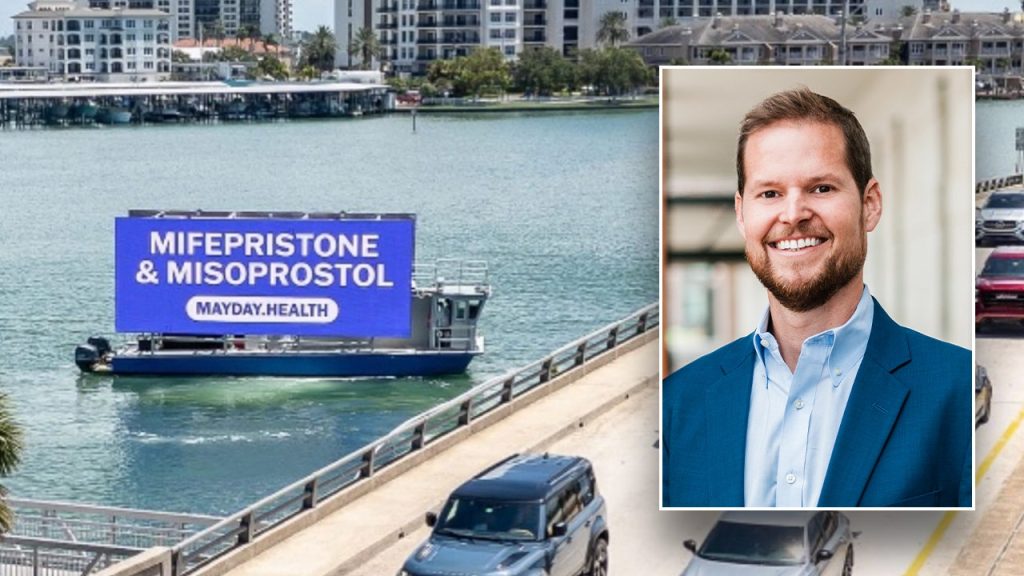Pro-Life Group Calls for Investigation into Abortion Pill Ads in Florida
A significant clash between reproductive rights advocates and pro-life organizations is unfolding in Florida, where 40 Days for Life has formally requested that state Attorney General James Uthmeier investigate what they describe as “deceptive and misleading” abortion pill advertisements. In a letter dated September 19, the pro-life organization specifically targeted Mayday Health, a New York-based nonprofit responsible for billboards promoting mifepristone and misoprostol across Florida. According to Shawn Carney, president and CEO of 40 Days for Life, these advertisements are particularly troubling because they appear in recreational areas frequented by vacationing families. “Those pictures are not artificial intelligence,” Carney explained. “Those are actual pictures of boats floating in front of tourists — trying to get a tan, trying to enjoy their time off of work — and yet they’re having abortion pills shoved in their face.”
At the heart of this dispute is the question of proper disclosure regarding abortion medication risks. The pro-life organization contends that Mayday Health’s advertisements fail to include critical FDA black box warnings about potential complications such as hemorrhage and infection. Additionally, they argue the ads omit federally required safety protocols and don’t adequately inform Florida residents about potential legal consequences of using these medications in a state with strict abortion restrictions. This omission of critical health information forms the basis of their complaint under Florida’s consumer protection laws. The legal challenge reflects broader tensions in post-Roe America, where state-by-state battles over reproductive rights continue to intensify as both sides adapt their strategies to a radically changed legal landscape.
Florida’s stringent six-week abortion ban provides important context for this controversy. As one of America’s most restrictive states regarding abortion access, Florida represents a critical battleground where nationwide organizations are testing different approaches to either expand or limit abortion services. 40 Days for Life believes the advertising campaign not only poses potential health risks to women but also deliberately misleads consumers about the legal status of abortion medications in Florida. “I think that they need to be investigated and possibly prosecuted because this definitely seems like a violation of Florida’s deceptive advertising law,” Carney stated in his comments to Fox News Digital. The investigation request highlights how commercial speech related to reproductive healthcare has become increasingly scrutinized in states with abortion restrictions.
The tension between these organizations reflects deeper cultural and generational shifts in abortion perspectives. Carney suggested that younger Americans, particularly Generation Z, are becoming more receptive to pro-life positions partly because of technological developments like ultrasound imaging. “Gen Z has turned against abortion because they’re the first generation in our country to ever have a photo of their own ultrasound,” he claimed. “And that’s why they are the most pro-life generation ever at their age.” Whether or not this characterization accurately represents generational attitudes, it reveals how both sides of the abortion debate are increasingly focused on winning over younger Americans as they develop their positions on reproductive rights. This generational framing adds another dimension to what was already a deeply polarized issue in American political and social life.
The grassroots structure of 40 Days for Life, which boasts over one million participants across 1,800 cities globally, allows them to identify and respond to local reproductive rights initiatives quickly. Carney emphasized this advantage when explaining why his organization was among the first to notice and challenge these advertisements. “When things like this happen at the local level, we’re the first to see it,” he explained. “So, when we see these new ad campaigns for abortion pills or whether we see doctors doing illegal abortions, we’re going to look into it and report it and take legal action.” This surveillance approach demonstrates how the post-Roe environment has empowered local pro-life organizations to act as informal regulators of abortion-related information and services in communities across America, particularly in states with restrictive laws.
As of the initial reporting, neither Florida Attorney General James Uthmeier nor representatives from Mayday Health had responded to requests for comment on this developing situation. Their eventual responses will likely shape not only the immediate outcome of this dispute but potentially influence how abortion medication is advertised nationally. The controversy underscores the complex intersection of state law, federal regulations, consumer protection, commercial speech, and deeply held moral convictions that now characterize America’s abortion debate. As legal battles continue across the country, both advocates and opponents of abortion access are developing increasingly sophisticated strategies to advance their respective positions within the constraints and opportunities presented by America’s new reproductive rights landscape. The eventual resolution of this Florida case could establish important precedents for how abortion-related information can be communicated in states with restrictive laws.















